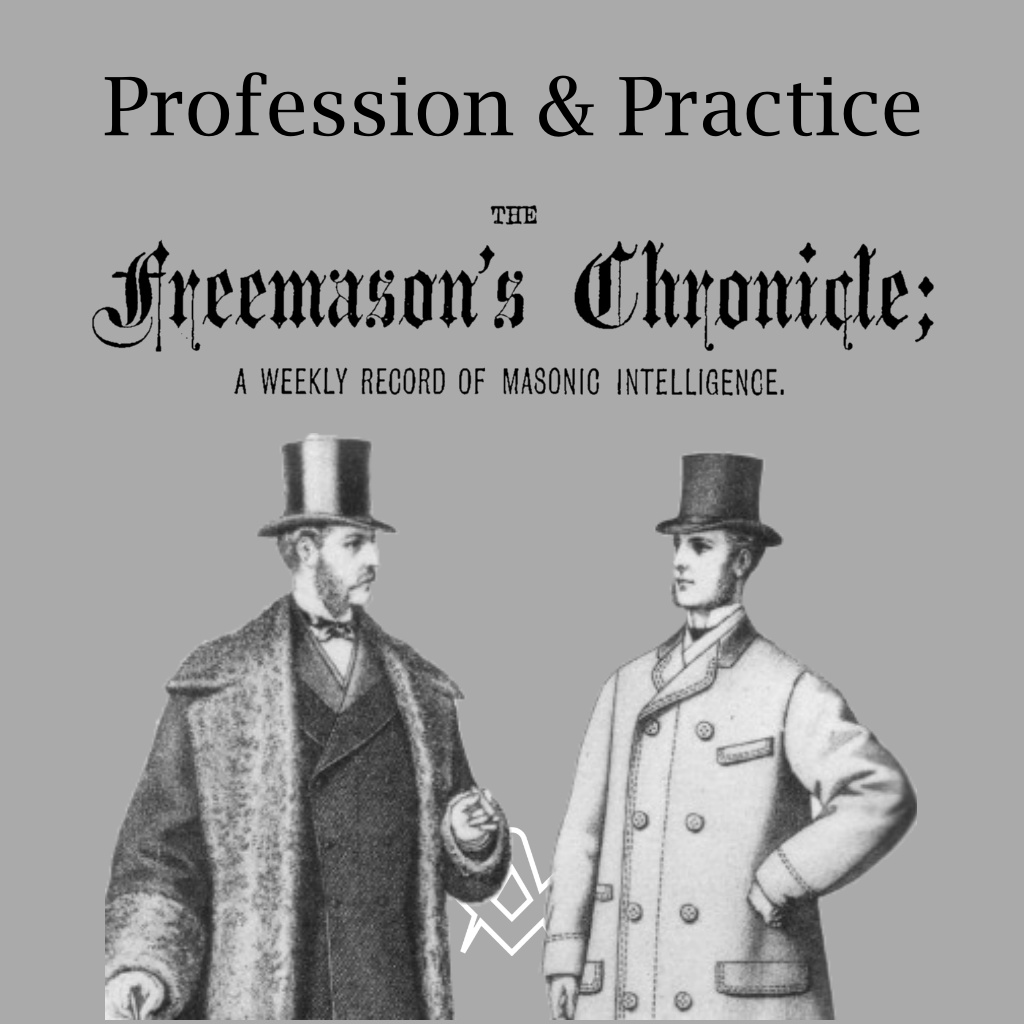Most of our readers in the course of their experience, have doubtless met with enthusiastic brethren who take it for granted that a Mason can do no wrong.
These enthusiasts are thoroughly convinced that the vast majority of those who join the Order are the most benevolent, the most moral, and the very noblest members of society. The theory in their minds, like some religious theories of “conversion”, is that the instant a man has been received into the mystic circle he becomes a new being.
The ignoble become noble minded, the hard hearted become sensitive, and the man of lax morals becomes a pattern of all the virtues. An enthusiastic over-estimate of the Order such as this, although it embodies a great deal of truth, is certain to do harm.
We have never undervalued enthusiasm, and indeed we regard it as a great moral force, but when a brother, bent, at all hazards, upon blowing the trumpet of fame for the Order, ventures to describe the whole of his confraternity in terms which would be flattering if applied to the saints, we cannot but think that such commendation is sure to excite antagonism.
The enemies of Masonry, on the watch for holes in our garments, will assuredly take up such a challenge as this. They will tell us that there are mean and ignoble Masons, mercenary Masons, they may add indeed, by way of capping the sweeping assertions of the enthusiast, that Masons generally are no better than other people, and are not to be distinguished from their neighbours for any of the special graces of character.
Possibly a calm and clear thinker might be disposed to admit the general truth of some of these charges, but he would join issue with reference to the latter, and, on fairly reasonable grounds; he might urge, that Masons are a carefully selected community, that whereas society is necessarily composed of persons of all classes and dispositions, the ranks of the Order are filled only with men whose characters will bear a close inspection.
Granted that men of the middle classes, for example, are generally speaking good citizens, the Mason, as such, gives an additional guarantee to society for his good behaviour, in the fact that he has become a member of a fraternity which rigidly punishes any infringement of a code which for high and pure morality will bear comparison with any system of ethics which has yet attracted the attention of men .
In saying thus much for the Order we should not unfairly beg the real point in dispute.
In fact, we are willing enough to admit that there are indifferent Masons in the Order. A community of saints is quite unknown in this sublunary sphere. Wherever men are banded together for any noble object, there will be people who will seek admission to their ranks for purely selfish purposes.
We are not, indeed, ignorant of the fact that the self seekers who employ Masonry for purposes of their own are to be found in every social grade. We should be the last to assert that the Order is more frequently degraded for purposes of trade than for objects which appear less sordid, but which in reality are not one whit more reputable. The rich man, who desires to get into a circle which may be entered by the agency of Grand Lodge, is unfortunately to be found occasionally in our midst.
Some men make Masonry an engine for obtaining power and distinction, and while in pursuit of this object they are often willing to simulate a benevolence they do not feel. Thackeray has remarked, over and over again in his wonderful fictions, that rich people will do far more unkind things than persons of low degree.
A poor man would blush to be seen squabbling over the expenditure of a few shillings.
He would be ashamed to depart from his word, or to permit any one to think that he had done so. Some of our brethren who are by no means rich are the most active in all works of benevolence. They seek no reward for their labours, and would be astonished if they received any.
But it has sometimes happened that a rich man has made his Masonic professions chime in with his personal interest. He does not indeed display the emblems of the Order over his door, or on his carriage, but there are other ways of trading on Masonry, and not a few candidates for social position have first qualified themselves by joining a Lodge.
Some of our brethren have painful personal recollections of men of this class, who are all things to all men in the Lodge room, but who greet a brother when they meet him in the street with the cut direct.
The great man, who is seeking to make his way into society, forgets the humbler member of the fraternity when it is convenient to do so, and only wakes up to a general and cordial recognition of his Masonic associates when his personal interests are directly at stake. We do not hesitate to characterise men of this stamp as unworthy members of the Craft.
They may be eloquent advocates of the claims of the charities, but they have no heart in the cause, and merely display a fictitious activity to suit their own convenience .
An insincere professor is, indeed, a very unpleasant person, and it is gratifying to know that, although they are not uncommon, they are yet few and far between.
A man whose zeal for Masonry keeps time with his personal interests, who is constantly making his voice heard while he has private objects of his own in view, but who is silent the moment he has accomplished his purpose, deserves to be received, when he appears among his brethren, with withering contempt.
We have known Masons who were always ready with honied phrases, but who invariably forgot the homely adage that ” fair words butter no parsnips.” They were willing to patronise everything; our Schools, our Benevolent Institutions, anything, in fact, which might be converted into a Masonic ladder to lift them above the crowd.
But when this height was gained they could afford to ignore the Charities, could turn their back upon their toiling brethren, and were utterly oblivious of the fact that they were indebted to the Order for all their poor social distinctions.
The cynic who decries Masonry is sure to point to men of this stamp when he is seeking to drive his adverse arguments home.
He reminds us of the persons who have pushed themselves to the front by means of the fraternity, and concludes by asking us whether our professions of purity are not a mere sham; whether our Order is not, after all, a gigantic organisation, based on selfish interests, and trading upon sacred principles which deserve a better fate than to be thus perverted.
Our answer to these unfair innuendoes is clear enough.
We frankly admit that there are men in our midst who are grossly selfish, in spite of their professions of benevolence and charity, but we urge that they are rare exceptions.
We challenge denial when we assert that the Order, as a whole, is perfectly pure, that its devotion to charity and general benevolence is no mere sham, and that Masons as a body are true men, who have done, and are still doing, their best to make toleration, peace and goodwill universally current in the world .
 The Freemasons Chronicle, a weekly record of masonic intelligence, was first published 2nd January 1875 London, England as an independent weekly journal of masonic interest and continued for 27 years.
The Freemasons Chronicle, a weekly record of masonic intelligence, was first published 2nd January 1875 London, England as an independent weekly journal of masonic interest and continued for 27 years.
It should be the business of a journal devoted to the interests of the Order to attempt the removal of prejudices such as these, which, though they may have little perceptible influence upon the prosperity of the Fraternity, yet have the effect of preventing timid or ill-informed persons from enlisting under its banner.
It will not only attempt to keep pace with the growing literary requirements of the day, but it will seek to exhibit the Order to the non-Masonic world divested of its technical details, and clothed in the garb of Charity and Brotherly Love.
The questions of the hour, which exercise the minds of thoughtful men, will be handled freely and broadly, without any tinge of political or sectarian bias.
The memoranda of Masonic gatherings which will appear from week to week, will be full and accurate; and as free interchange of opinion is one of the best signs of life and vigour in any society, ample scope will be given for Correspondence on topics of interest to the Order.
If we may venture upon a new rendering of words which recent events have made memorable, we will say here, once and for all, that we will be keen men of business, and will spare no effort, consistent with honour, to achieve commercial success; but first, and before all things, we will prove to our brethren and the world that we are FREEMASONS.
Recent Articles: The Freemason's Chronicle
 Operative And Speculative Masonry Explore the fascinating transition from Operative to Speculative Masonry in our latest post. Discover historical insights from Augustus C. L. Arnold and Rev. Wm. P. Strickland, shedding light on Freemasonry's evolution and its enduring principles. Dive into the rich history and significant milestones that shaped modern Freemasonry. - The Freemason's Chronicle - 2 September 1876 |
 Discover the true essence of Freemasonry, an ancient order founded on the profound principles of love for God and man. It's a call to rise above mere appearances, to embody genuine virtue and benevolence, transcending societal pretense. Embrace the transformative power of simplicity, and let the authentic glories of Freemasonry inspire your path. |
 Discover the intriguing story of a man who became a Mason but openly professed his dislike for the institution. Unravel the peculiar circumstances that led him down this path and explore the unexpected consequences that followed. Dive into this thought-provoking account that challenges our notions of loyalty and reveals the complexities of human nature within the Masonic fraternity. |
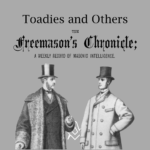 In the realm of Masonry, the principles of equality and respect are paramount. Yet, the presence of toadies—those who obsequiously seek favour from the influential—threatens these ideals. While Masonry embraces diverse beliefs and backgrounds, it rejects the sycophantic behaviours of toadies, flunkeys, and tuft-hunters, urging members to uphold genuine respect and self-worth. The Freemason's Chronicle - 22nd January 1876 |
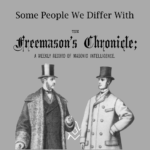 Unveiling the Unpleasant: Some People We Differ With Discover the intriguing dynamics of quarrels within the Masonic brotherhood. From the cantankerous to the litigious, the peevish to the vengeful, delve into the characters that challenge fraternal harmony. Explore their motives, temperaments, and the art of navigating disputes with these fascinating brethren. Brace yourself for a riveting journey into the world of conflicting personalities. |
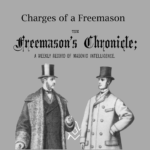 Unravelling the Masonic Mystique: A Deep Dive into the Freemasons' Charges - Explore the intricate world of Freemasonry, its principles, rituals, and the mechanisms for resolving internal disputes. Discover how this ancient fraternity fosters unity, promotes moral conduct, and upholds the sanctity of its secrets, while navigating the complexities of modern society. - The Freemason's Chronicle - 4 December 1875 |
 Unlock the hidden lessons of Masonic Studies! Don't settle for superficial knowledge or mere rituals. Discover the true depth and meaning behind Freemasonry. Expand your understanding of Tracing-Boards, Lectures, and more. Join regular Lodges of Instruction to enhance your Masonic journey. Become a knowledgeable Freemason, not just a token-bearer. Unleash the power of true Masonic wisdom today! |
 Uncover the incredible story of how Masonry saved the life of a Crimean War foot soldier in this historical and masonic account. Through the first hand experience of a soldier engaged in fierce hand-to-hand combat, witness the fateful encounter with a Russian Freemason that changed the course of his life. Learn how brotherhood and a deep dedication to the craft can lead to unforeseen and life-saving circumstances on the battlefield. |
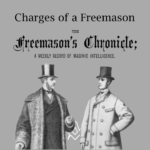 The Freemason's Chronicle - Charges of a Freemason The secrets of Masonry are the exclusive property of the Craft, and can never be communicated to one who is a mere labourer and not an accepted Mason. Hence, no labourer, that is, one who has not been regularly initiated in a legal Lodge. Article first published in The Freemason's Chronicle, 27 November 1875 |
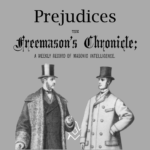 The Freemason's Chronicle - Prejudices Prejudices are partial judgments in favour of, or against certain persons or things, and, for convenience sake, may be ranged in two categories—those which are, comparatively speaking, harmless, and those which are harmful. Article first published in The Freemason's Chronicle, Oct. 2 1875. |
 The Freemason's Chronicle - Cliques Is Freemasonry - a Clique ? Man has been defined as a gregarious animal, but in his highly civilised condition he is gregarious only to a limited extent. First published in The Freemason's Chronicle, Oct. 2 1875, addresses the same challenges then as now. |
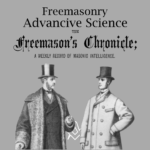 The Freemason's Chronicle - Freemasonry - an Advancive Science Is Freemasonry - an Advancive Science ? Not to confuse advancement with innovation. Has it been the case that Freemasonry's survival for 300 years plus is due to being an Advancive Science, tending to advance. First published in The Freemason's Chronicle 18 September 1875, addresses the same challenges then as now. |
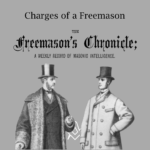 The Freemason's Chronicle - Charges Of A Freemason An interpretation of the "Charges of a Freemason", written Bro. Cornelius Moore and published in 1875, that introduce certain opinions that for some readers, will not sit well in contemporary times. - The Freemason's Chronicle, Sept. 11, 1875 |
 On The Order Of The Temple And Its Doctrine. THE Order of the Temple is divided into two great classes, denominated respectively the Order of the Temple and the Eastern Order. The Eastern Order gave birth to the Order of the Temple, and in the course of time has become an appendage of the latter. It is in ancient Egypt that we find the cradle of the Eastern Order. The Freemason's Chronicle, Sept. 4, 1875 |
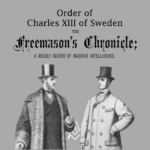 Order of Charles XIII of Sweden The following translation of the Manifesto of King JL Charles XIII of Sweden, on the occasion of his establishing the Masonic Order which bears his name, and of the Statutes of the said Order, may be interesting to our readers. The Freemason's Chronicle, Aug. 28, 1875 |
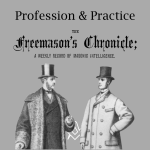 Most of our readers in the course of their experience, have doubtless met with enthusiastic brethren who take it for granted that a Mason can do no wrong. These enthusiasts are thoroughly convinced that the vast majority of those who join the Order are the most benevolent, the most moral, and the very noblest members of society. - The Freemason's Chronicle 10 July 1875 |
 An article investigating the relationship between masonry and citizenship. Are the principles of Freemasonry aligned with the freemason's claim to be a better citizen of the world? The Freemason's Chronicle - 19 June 1875 |
 A visitor must make clear his identity to the satisfaction of the Lodge he proposes to visit. More than once have we been asked to explain our views as to the reception of strangers in a Lodge. - The Freemason's Chronicle - 29 May 1875 |
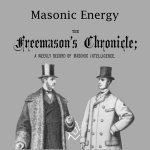 Is there reason in the accusation that Masonic energy looks only to a course of good feeds, when we can point to such grand results as have been achieved in these latter years, both in respect of the extension of our Order ? - 1May 1875 |
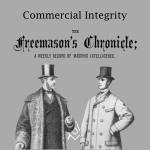 Implementing Freemasonry's peculiar system of morality in our day to day business affairs was the topic of this article, Commercial Integrity, first published in The Freemason's Chronicle - 8 May 1875 |
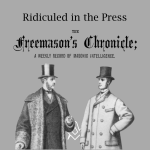 Ridicule has been somewhat illogically described as the test of truth. If it were so, Freemasonry ought to have perished long since. Two press reports from May 1875 covering the |
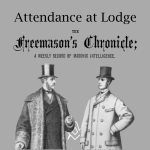 There are many things which Freemasonry will do for a man in the way of opening his mind and giving him larger and kindlier views of life, but Freemasonry itself, cannot eradicate the natural bias of the disposition. |
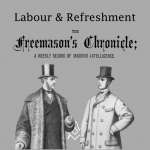 There is, we fear, too marked a tendency in very many Lodges to hasten through its labours, with a view to entering, as soon as possible, upon the business of refreshment. - The Freemason's Chronicle 17th April, 1875 |
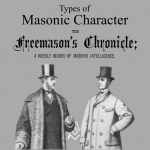 Another example that demonstrates that nothing really changes in Freemasonry. In an article the Types of Masonic Character published 145 years ago in The Freemason's Chronicle 10th April, 1875 |
 A brief history on the relationship between the British Monarchy and the craft - The Freemason's Chronicle 20th March , 1875 |
 What are the qualities of a convivial man and how does this dovetail perfectly in to Freemasonry ? 16th March, 1875 |
 A review of the "Sketch for the History of the Dionysian Artificers," a fragment, by Hyppoli to Joseph Da Costa - This little work may be regarded as, so to speak, the Holy Grail of Masonry. |
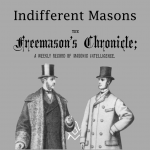 Nothing really changes, an article Indifferent Masons, From Le Monde Maçonnique 1874. Translation published in The Freemason's Chronicle 20th February, 1875 |
 In handling an intruder in the lodge, we endeavoured to show that a good Mason should be a gentleman, and a sincere man. The Freemason's Chronicle 20th February, 1875 |
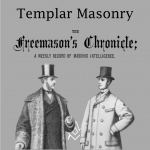 Templar Masonry - a historical aspect of the Religious and Military Order of the Temple published in The Freemason's Chronicle 13th February, 1875 |
 Secrecy perhaps the strongest objection urged by the enemies of the Masonic Order against its existence published in The Freemason's Chronicle 20th March 1875 |
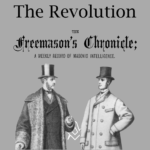 Freemasonry In The United States during And After The Revolution We take a look at Freemasonry in the United States during and after the Revolution first published in The Freemason's Chronicle - February 6, 1875 |
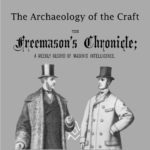 We take a look at the archaeological connection with the Craft, first published in The Freemason's Chronicle - January 30, 1875 |
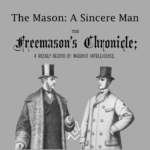 What it means to a Freemason to be a sincere man. Extract: first published in The Freemason's Chronicle - January 23, 1875 |
 What it means to a Freemason to be a citizen of the world ? First published in The Freemason's Chronicle - January 16, 1875 |
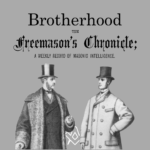 Brotherhood! In that one word what sympathetic associations arise. First published in The Freemason's Chronicle - January 9, 1875 |
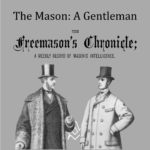 This opening article was written 145 years ago, yet it resonates with Freemasons today as it did then. First published in The Freemason's Chronicle, January 2, 1875, Issue 1 |
masonic knowledge
to be a better citizen of the world
share the square with two brothers

click image to open email app on mobile device



